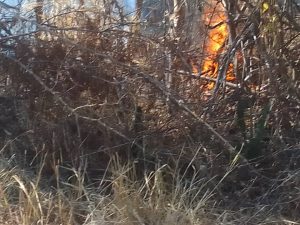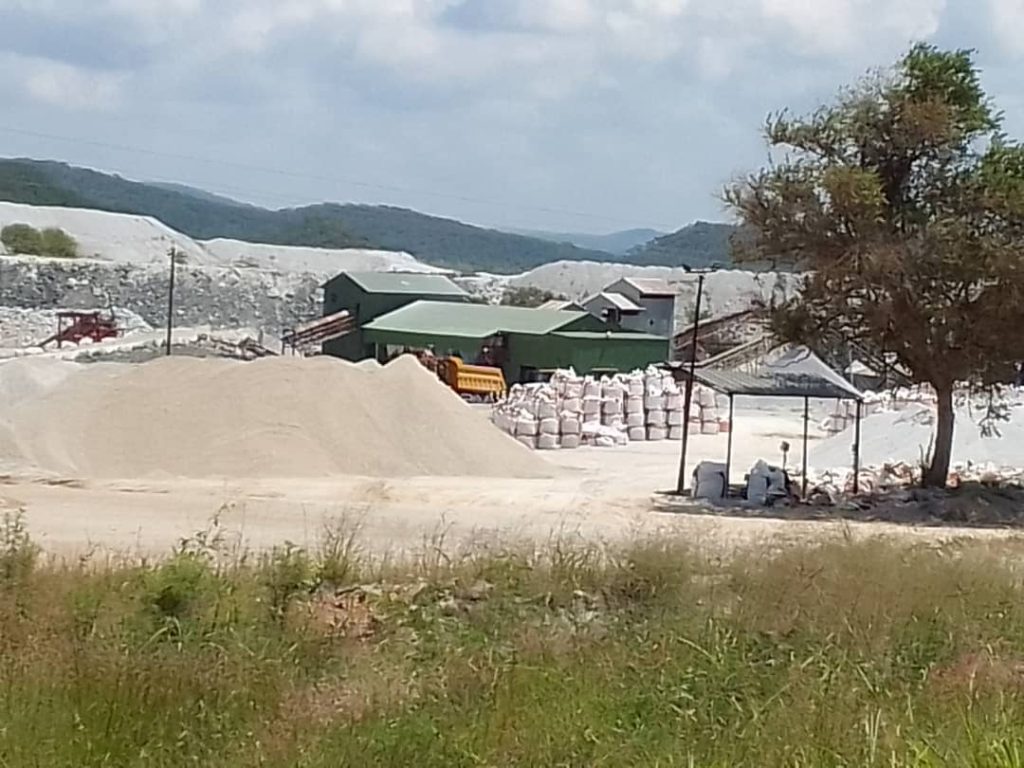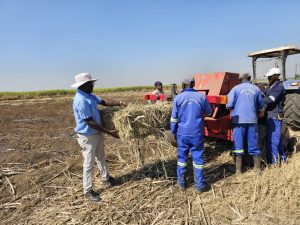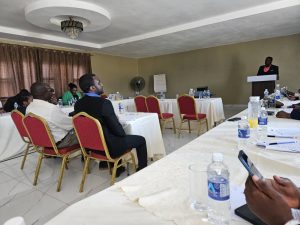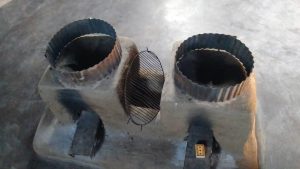Moses Ziyambi
Bikita Minerals is making frantic efforts to hide circumstances surrounding the recent death of an employee, fearing that the issue may provoke another strong government response five months after the company was ordered to suspend operations over many abuses including lackluster safety standards.
Nelson Musendekwa, who was a plant operator at the mine’s gravel packing unit, died on October 24 under dubious circumstances, and his body was retrieved 12 hours later after a crane was hired from Masvingo to remove a vibrating bin discharger which still trapped his body.
Sources said the bin which killed Musendekwa, of Mafuka Village under Chief Marozva, was hastily built and had not yet been certified and commissioned as per regulations.
The sources said after the accident, mine manager David Mwanza visited the site and expressed shock that such a substandard bin had been put into use.
When contacted for comment, Mwanza confirmed that the bin was shoddily built and had not the requisite undergone tests and inspections prior to use.
“It was tragic. The structure was not properly done and even the engineering plans were not approved. I don’t know how such a structure could be used and it was a terrible mistake that it came into use before undergoing the necessary tests,” said Mwanza.
Mwanza said Bikita Minerals was not qualified to build such structures and the job should have been subcontracted to deserving companies.
“It was built by some guys in the engineering department but it was supposed to have been built by somebody else,” said Mwanza, suggesting that many corners were cut in the construction process.
Other sources said the Chinese layer of the management team, led by the company’s head of department for human resources and administration Lui Rui, often acts with impunity and tends to have little disregard for recommendations made by local members of staff regardless of seniority, and this has often seen critical safety precautions being disregarded.
When contacted for comment, the Minister of Mines and Mining Development Soda Zhemu said he was checking with the Masvingo Provincial Mines Office to ascertain whether or not the case was being investigated.
“In cases like that, the provincial office must receive a report and I will check to see what happened and get back to you as soon as possible,” said Zhemu. He had not provided an update by the time of publishing.
The 44-year-old Musendekwa, who is said to be the fifth accident fatality since the mine was taken over by the Chinese 22 months ago, was working with seven other workers in the early morning shift when disaster struck, but his colleagues managed to escape unhurt.
“He was operating under extremely difficult and dangerous conditions when the accident occurred. The bin was poorly-built and the mine engineer was aware of this. The mine engineer actually reported the issue to the head engineer, a Chinese national, who took no action.
“In the days preceding the accident, the instrument technician refused to install lights on it citing its shaky base as a danger to safety. The production foreman also reported the fault to his Chinese bosses but they ignored him. The engineering foreman also knew it and he once raised a written complaint about it but it came to nothing,” said a source.
Mine engineer Jayson Nyambo refused to provide a comment when this reporter contacted him to give his side of the story.
Another source said tipper drivers who offloaded their ore into the bin had on many occasions expressed fear for their own safety, and the safety of their vehicles but they too were ignored.
Several efforts were made to get a comment from the lithium mining company’s public relations officer Collen Nikisi who kept on prevaricating over many days despite promising to facilitate a press statement.
After the accident, Nikisi and Liu went and explained the case to Chief Marozva who is said to be very angry with company’s lack of seriousness with the safety of employees.
Chief Marozva, born Ishmael Mudhe, is said to be particularly unhappy with Lui over his deliberate endangering of employees by continually ignoring important matters of safety. Sources said Liu always pushes employees to deliver on targets even under the very dangerous of conditions.
Being the traditional authority of the areas which covers Bikita Minerals, Chief Marozva said he was conducting his own investigations into the matter.
When asked whether or not he was satisfied with how safety issues are generally handled at the mine, he said there could be serious breaches which are not obvious to the ordinary eye.
“There could be ordinary safety issues that are obvious to everybody, but there could also be other technical issues that are beyond many of us,” Chief Marozva said.
Before Musendekwa’s death, sources said, Liu had threated everybody who pointed to the glaring structural weaknesses of the bin discharger which eventually killed Musendekwa.
Liu is also said to have threatened the Human Resources manager Tonderai Charehwa to find a way to force the deceased’s family to accept a US$10 000 payout and keep their silence.
Family members who were contacted for comment refused to talk, saying Liu and Nikisi had ordered them to not speak to the media.
When contacted for comment, an irate Liu denied all allegations made against him, saying he was not at all involved in matters of the production department.
“There is not truth in all that. I am not involved with the production department and I do not know about any report being made prior to the accident,” Liu said.
When quizzed further, Liu burst into a temper and demanded to know who had provided this reporter with his phone number before cutting the call.
Many sources said Liu was overbearing in his attitude, seeking to control what happens in every department, oftentimes cutting corners and endangering the safety and welfare of employees.
“He is the de facto mine manager and head of every department, and he rules with impunity without listening to anybody, let alone locals even if their offices are higher than his,” said one source.
The source said after the accident, Liu instructed other employees not to take any pictures of the site and ordered all those that had already done so to delete them.
They said Liu also ordered employees to alter aspects of their reports which blamed the accident on the substandard bin so that all reports are aligned with the main report produced by the company.
Sources said police officers who attended the scene of the accident, had initially hinted that culpable homicide charges could be pressed although the plans were abandoned under unclear circumstances.
Bikita Institute of Land and Development (BILA), criticized the mining company after the tragic death of Musendekwa.
“Bikita Institute of Land and Development strongly condemns any act that violates the fundamental right to life, which is sacred and protected by the Constitution of Zimbabwe. The recent incident involving the untimely death of Nelson Musendekwa at Bikita Minerals raises serious concerns about the mining company’s practices and their adherence to constitutional provisions,” the statement said.
“Bikita Institute for Land and Development calls for a thorough investigation into the circumstances surrounding this tragic event. We expect accountability and transparency from all parties involved to ensure justice is served,” the organization said.
Centre for Natural Resource Governance (CNRG) director Farai Maguwu said the death of Musendekwa showed that Zimbabweans were on their own in seeking to hold Chinese mining companies to account.
“Musendekwa is not just a statistic; his death is a loss to the country and to his family as he was a breadwinner. In a normal country, his family should be able to get compensation of over half a million US dollars,” said Maguwu.
He said the death showed the impunity and violence with which Chinese mining companies were conducting business in the country.
“That’s what happens when politicians get into bed with unethical mining companies that have no regard for the rights and welfare of locals. Zimbabweans are on their own in seeking justice and accountability. Bikita Minerals is a good example of how mining should not be conducted in this country,” said Maguwu.
He said his organization had written to the Ministry of Mines and Mining Development, police and other arms of government seeking explanations and investigations into the death of an alleged illegal lithium miner on March 28 this year, but no response has been received to date.
When contacted for comment, Zimbabwe Diamonds and Allied Mining Workers Union (ZDAMWU) secretary general, Justice Chinhema refused to comment, saying he will first wait for a report on the incident from the Ministry of Mines and Mining Development.
When challenged on the logic of that approach coming from a national union leader who ostensibly represents the interests of workers, Chinhema changed tune and claimed that Musendekwa’s family had asked that no comment be provided regarding the incident ‘until they were ready’.
The ZDAMWU boss has dramatically softened his tone against Bikita Minerals ever since the mining company invited him and other union leaders to conduct the 2023 Workers’ Day celebrations at the Lithium Stadium free of charge.
Issues of employee safety is topical at Bikita Minerals where one local employee was recently left nursing serious injuries after a brutal knife attack by another employee of Chinese origin.
The company suspended operations on May 15 after the government raised many issues including those related to mining administration and safety issues.
In a letter signed by Dr Geral Gwinji on May 10, the permanent secretary in the Ministry of Mines and Mining Development, government ordered Bikita Minerals to establish and a health and safety committee and to provide employees with protective clothing in compliance with Statutory Instrument 68 of 1990.
